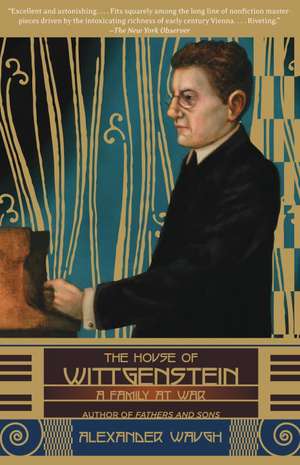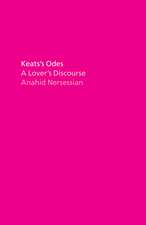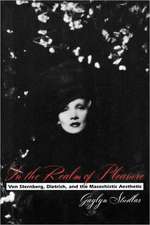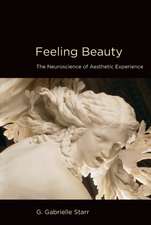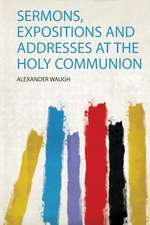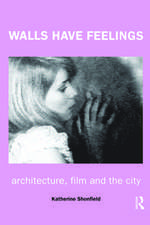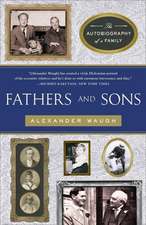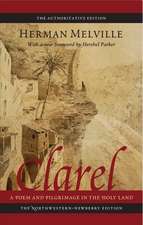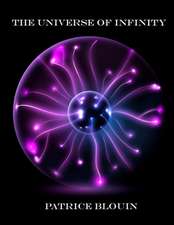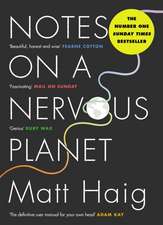The House of Wittgenstein: A Family at War
Autor Alexander Waughen Limba Engleză Paperback – 31 mar 2010
The Wittgenstein family was one of the wealthiest, most talented, and most eccentric in European history, held together by a fanatical love of music yet torn apart by money, madness, conflicts of loyalty, and the upheaval of two world wars. Of the eight children, three committed suicide; Paul lost an arm in the war and yet stubbornly pursued a musical career; and Ludwig, the odd youngest son, is now regarded as one of the greatest philosophers of the twentieth century. Alexander Waugh, author of the acclaimed memoir Fathers and Sons and himself the offspring of a famous and eccentric family, tells their baroque tale with a novelistic richness to rival Thomas Mann’s Buddenbrooks.
| Toate formatele și edițiile | Preț | Express |
|---|---|---|
| Paperback (2) | 63.49 lei 3-5 săpt. | |
| Bloomsbury Publishing – 6 sep 2009 | 63.49 lei 3-5 săpt. | |
| Anchor Books – 31 mar 2010 | 111.83 lei 6-8 săpt. |
Preț: 111.83 lei
Nou
Puncte Express: 168
Preț estimativ în valută:
21.40€ • 23.32$ • 18.03£
21.40€ • 23.32$ • 18.03£
Carte tipărită la comandă
Livrare economică 23 aprilie-07 mai
Preluare comenzi: 021 569.72.76
Specificații
ISBN-13: 9780307278722
ISBN-10: 0307278727
Pagini: 333
Ilustrații: 16 PP. B&W
Dimensiuni: 141 x 202 x 19 mm
Greutate: 0.35 kg
Editura: Anchor Books
ISBN-10: 0307278727
Pagini: 333
Ilustrații: 16 PP. B&W
Dimensiuni: 141 x 202 x 19 mm
Greutate: 0.35 kg
Editura: Anchor Books
Notă biografică
ALEXANDER WAUGH is the grandson of Evelyn Waugh and the son of columnist Auberon Waugh. He has written several books, including Classical Music: A New Way of Listening, Time, and God. He lives in Somerset, England, with his wife and three children.
Extras
1 VIENNESE DEBUT
Vienna is described--over-described--as a city of paradox; but for those who do not know this or have never been there, it may be pictured as a capriccio drawn from the flat sound bites of the Austrian Tourist Board, a place defined by its rich cream cakes, Mozart mugs and T-shirts, New Year's waltzes, grand, bestatued buildings, wide streets, old fur-coated women, electric trams, and Lipizzaner stallions. The Vienna of the early twentieth century was not marketed in this way. In those days it was not marketed at all. Maria Hornor Lansdale's once-indispensable guide of 1902 draws a portrait of the Hapsburg capital that is at once grubbier and more dynamic than anything suggested in our modern guidebooks. Her book describes parts of the Innere Stadt or city center as "dark, dirty and gloomy" and of the Jewish quarter she wrote: "The interiors of the houses are unspeakably squalid. As one ascends the stair the rickety banister sticks to one's fingers, and the walls on either side ooze. Entering a small dark room the ceiling is covered with soot and the furniture crowded close together."
A German might step onto a Viennese streetcar and find himself unable to exchange a word with any of his fellow passengers, for the city then was home to a rapidly expanding population of Magyars, Rumanians, Italians, Poles, Serbs, Czechs, Slovenes, Slovaks, Croats, Ruthenians, Dalmatians, Istrians and Bosnians, all of whom lived together apparently in happiness. An American diplomat describing the city in 1898 wrote:
A man who had been but a short time in Vienna, may himself be of pure German stock, but his wife will be Galician or Polish, his cook Bohemian, his children's nurse Dalmatian, his man a Servian, his coachman a Slav, his barber a Magyar, and his son's tutor a Frenchman. A majority of the administration's employees are Zechs, and the Hungarians have most influence in the affairs of the government. No, Vienna is not a German city!
The Viennese were regarded abroad as a good-natured, easygoing, and highly cultured people. By day the middle class congregated in cafes, spending hours in conversation over a single cup of coffee and a glass of water. Here newspapers and magazines were provided in all languages. In the evenings they dressed for dancing, for the opera, the theater or the concert hall. They were fanatical about these entertainments, unforgiving of the poor player who forgot his lines or the singer who sang sharp, while idolizing or deifying their favorites. The Viennese writer Stefan Zweig remembered that passion from his youth: "Whereas in politics, in administration, or in morals, everything went on rather comfortably and one was affably tolerant of all that was slovenly and overlooked many an infringement, in artistic matters there was no pardon; here the honour of the city was at stake."
***
On December 1, 1913, there was cold sunshine over most of Austria. By the evening a mist had spread from the northern slopes of the Carpathian Mountains down to the rolling hills and verdant lowlands of the Alpine Foreland. In Vienna, the air was still, the streets and pavements quiet and the temperature uncommonly cold. For the twenty-six-year-old Paul Wittgenstein this was a day of high excitement and excruciating tension.
Clammy fingers and cold hands figure in every pianist's worst dream--the slightest sheen from the glands of the pads can cause the fingers to slip or "glitch," accidentally hitting two adjacent keys at once. The sweaty-fingered pianist is slave to his caution. If his hands are too cold, the finger muscles will stiffen. Coldness in the bones does not drive sweat from the skin and in the worst instances the fingers may be immobilized by cold while remaining slippery with sweat. Many concert artists spend a nervous hour or two before a winter recital with their hands plunged into a basin of hot water.
Paul's concert debut was scheduled to start at 7:30 p.m. in the Grosser Musikvereinsaal, a hallowed place, of near perfect acoustic, where Brahms, Bruckner and Mahler heard many of their works performed for the first time. It is from here--the "Golden Hall"--that the famous New Year orgy of waltzes and polkas is annually broadcast to the world. Paul did not expect his debut to sell out. The auditorium had a seating capacity of 1,654, with 300 standing places. It was a Monday night, he was unknown, and the program he had chosen to perform was unfamiliar to the Viennese public. He was, however, well acquainted with techniques for papering a house. As a boy he had been sent by his mother to buy 200 tickets for a concert in which a family friend was playing the violin. The man at the ticket office dismissed him as a tout, shouting in his face: "If it's tickets for resale you're wanting you can go elsewhere!" Paul returned to his mother, begging her to appoint someone else to the task. For the first time in his life he felt ashamed of being rich.
If the hall was going to be half empty, at least those seats that were occupied should be filled with as many allies as possible. He wanted to create an atmosphere that would give the impression of strong public support. The Wittgenstein family was large and well connected. All siblings, cousins, uncles and aunts were expected to attend and to applaud uproariously at the end of each piece regardless of how they felt he had played. Tenants, servants and the servants' distant relations, many of whom had never before attended a concert of serious music, were plied with tickets and summoned to appear. Paul could have hired a smaller hall but was advised that the critics might not show up if he did so. He needed Max Kalbeck of the Neues Wiener Tagblatt and Julius Korngold of the Neue Freie Presse to be there. These were the two most influential music critics in Vienna.
Every detail was carefully considered. A concert with the Vienna Philharmonic Orchestra would have cost him nearly twice as much as the less prestigious Tonkunstler Orchestra, but money was no object. "Quite apart from the price," he later wrote, "I would not hire the Vienna Philharmonic. Probably they won't play as you want them to do, it will look like a horse which you can't ride; and then if the concert is a success, people might say it was only due to the orchestra's merit." He chose the Tonkunstler.
The conductor, Oskar Nedbal, was twelve years older than Paul, an ex-pupil of Dvorak, a composer and a first-class violist who had joined the Tonkunstler Orchestra in 1906 after ten years as conductor of the Czech Philharmonic. On Christmas Eve 1930, he threw himself head first from a fourth-story window of a hotel in Zagreb and was heard of no more.
Paul's program was unusual, obstinate and provocative. He wanted to present four consecutive works for piano and orchestra--four virtuosic concertos in a single evening. Irrespective of success or failure, this young man's debut would long be remembered as an audacious gymnastic spectacle.
Works by the inebriate Irish composer John Field, who had died in Moscow of cancer of the rectum in 1837, had long fallen from fashion in Vienna. Nowadays "Drunken John" is best remembered as the man who invented the nocturne--a form of short piano reverie later popularized by Chopin. Paul's valet and cook were probably not the only ones in the audience that night never to have heard of him. Even among the musical cognoscenti of 1913, few would have rated Field as worthy of the Golden Hall, for Vienna had a musical heritage of its own, the most illustrious of any city in the world, and to those raised on a diet of Mozart, Haydn, Beethoven, Schubert, Brahms, Bruckner and Mahler (all of whom had lived at one time or another within the city walls), Field's music would have seemed at best an insipid curiosity, at worst a bad-taste joke.
History does not record how Paul felt in the hours leading up to the concert or his state of mind as he dressed in his tails, warmed his hands in the green room, climbed the steep steps onto the concert platform and took his bows before an audience of friends, strangers, critics, mentors, teachers and servants, but he never succeeded in controlling his nerves. Later he was observed to bash the walls with his fists, tear up his music or hurl furniture across the room in the fraught final minutes before walking onto the stage.
The Field Concerto is in three movements lasting a total of thirty-five minutes. If Paul failed to notice at the time, he must have been informed afterward that Julius Korngold, chief critic of the Neue Freie Presse, had left the auditorium during the applause and had not returned to hear his renditions of Mendelssohn's Serenade and Allegro giocoso, the Variations and Fugue on a Theme of Czerny by Josef Labor, or Liszt's crashing bravura Concerto in E flat. As he and his family scoured the papers and music journals in the days following the concert, this critic's curious behavior must have weighed heavily on their minds.
Ludwig, Paul's younger brother, was not in Vienna to hear him play. Three months earlier he had moved from England (where he had been studying philosophy at Cambridge) into two rooms of a postmaster's house in a tiny village at the bottom of a fjord, north of Bergen in Norway. According to the diaries of his closest friend, his decision to exile himself was "wild and sudden." In September he had stated that he wished to withdraw from a world in which "he perpetually finds himself feeling contempt for others and irritating others by his nervous temperament." He was also at this time suffering (as he often did) from delusions of his own death. "The feeling that I shall have to die before being able to publish my ideas is growing stronger and stronger in me every day," he wrote to his tutor and mentor at Cambridge. A fortnight later a shock spurred him on his course of action--it took the form of a letter announcing that his sister Gretl and her husband Jerome were coming to live in London. "He can't stand either of them and he won't live in England liable always to visits from them," his friend recorded. "I am leaving at once," Ludwig exclaimed, "because my brother-in-law has come to live in London and I can't bear to be so near him."
The whole family wanted Ludwig to come to Vienna for Paul's concert and for Christmas, but he was resistant and the obligation to conform weighed heavily upon him. His family depressed him, the previous Christmas had been horrific, he was in low spirits and his philosophical work was advancing at a snail's pace. "UNFORTUNATELY I have to go to Vienna for Christmas," he wrote to a friend. "The fact is my mother very much wants me to, so much so that she would be grievously offended if I refused. She has such dreadful memories of just this time last year that I do not have the heart to stay away."
2 THAT TIME LAST YEAR
Christmas at the Wittgensteins' Winter Palais on the Alleegasse in Vienna's Wieden district was, by tradition, an extravagant and ceremonious affair to which the family attached the greatest significance; but the Christmas of 1912 (the year before Paul's concert debut) was different from all the rest, for on that occasion the family's energies and enthusiasms were subdued by the grim realization that its head (Paul and Ludwig's father Karl Wittgenstein)--stout-chested and leathery of complexion--was dying in his bedroom upstairs. He was suffering from cancer of the tongue and a month earlier had submitted himself to the scalpels of the distinguished Viennese surgeon Baron Anton von Eiselsberg. To gain access to the lesion Dr. von Eiselsberg had needed first to remove a large section of Karl's lower jaw. Only then was he able to proceed with the extirpation of the neck glands, the floor of the mouth and whatever was left of Karl's tongue after previous surgical raids. His bleeding was staunched by a team of assistants using the modern technique of electrical cautery.
Karl had smoked large Cuban cigars all his adult life and continued to use them even after the first symptoms of his disease had been diagnosed seven years earlier. Then he was advised by doctors not to move in order to effect a cure. By the end, he had endured seven operations, but the cancer continued to outmaneuver every stratagem that Dr. von Eiselsberg could devise against it, shifting in a sequence of malignant sideways steps from thyroid to ear to throat and eventually to his tongue. His final operation took place on November 8, 1912. Eiselsberg had warned him that there was a risk of his dying under the knife and on the evening before, as the doctors were sharpening their tools, Karl and his wife Leopoldine retired to the opulent gloom of the Musiksaal. He took out his violin, she sat at the piano, and together they played through some of their favorite works by Bach, Beethoven and Brahms in a long, unspoken farewell to one another.
The next morning, in the center of his plain, well-lit, clean-tiled theater, Dr. von Eiselsberg cut the tumor from Karl's mouth. Perhaps this time he had finally succeeded in eradicating the last traces of the cancer, but for Karl--flat, speechless and entrapped by the curse of a secondary infection--it was already too late. He left the clinic to die at home. And thus it was that on Christmas Day 1912, as he lay outstretched, weakened and feverish upon his bed, his family was gathered round in a mood of grim expectation.
3 KARL'S GREAT REBELLION
Hermine (pronounced Hermeena), nicknamed Mining, was the firstborn of Karl's nine children and his favorite child. Named after her grandfather, Hermann Wittgenstein, her birth marked a turning point in Karl's business fortunes and as a consequence he always treated her as a lucky mascot. She was thirty-nine years old at the time of his dying, unmarried, still living at home and still at his beck and call. In character she was inward looking, a repressed person, whose movements were stiff, whose stance was erect and whose manner (to those who did not know her well) appeared to be arrogant or aloof. In fact she suffered from low self-esteem and was ill at ease in the company of strangers. When Brahms came to dinner and she was allowed to sit with him at the top table, she became so agitated with nervous tension that she had to leave the room and spend most of the evening vomiting into one of the Palais lavatories. Photographs of the youthful Hermine portray her as alert, feminine, perhaps even pretty, but an instinctive need for privacy put her always on her guard against the approaches of men. They say she had one or two suitors in her prime but none so ardent as to relieve her of her maidenhood.
As the years piled on she withdrew from all but her closest circle of friends and family, her smile shortened and she grew self-conscious, gracious, vigilant and schoolmarmish. On the hottest days, she dressed in the heaviest and most somber clothes, brushing her hair flat back against her head and pressing her ponytail into a tight coil at the nape of her neck. Her ears were broad and heavy and her nose uncommonly prominent--both features inherited from her father. In her last years she resembled a handsome army officer in the first gloat of early retirement, a bit like Captain von Trapp in the film version of The Sound of Music.
Vienna is described--over-described--as a city of paradox; but for those who do not know this or have never been there, it may be pictured as a capriccio drawn from the flat sound bites of the Austrian Tourist Board, a place defined by its rich cream cakes, Mozart mugs and T-shirts, New Year's waltzes, grand, bestatued buildings, wide streets, old fur-coated women, electric trams, and Lipizzaner stallions. The Vienna of the early twentieth century was not marketed in this way. In those days it was not marketed at all. Maria Hornor Lansdale's once-indispensable guide of 1902 draws a portrait of the Hapsburg capital that is at once grubbier and more dynamic than anything suggested in our modern guidebooks. Her book describes parts of the Innere Stadt or city center as "dark, dirty and gloomy" and of the Jewish quarter she wrote: "The interiors of the houses are unspeakably squalid. As one ascends the stair the rickety banister sticks to one's fingers, and the walls on either side ooze. Entering a small dark room the ceiling is covered with soot and the furniture crowded close together."
A German might step onto a Viennese streetcar and find himself unable to exchange a word with any of his fellow passengers, for the city then was home to a rapidly expanding population of Magyars, Rumanians, Italians, Poles, Serbs, Czechs, Slovenes, Slovaks, Croats, Ruthenians, Dalmatians, Istrians and Bosnians, all of whom lived together apparently in happiness. An American diplomat describing the city in 1898 wrote:
A man who had been but a short time in Vienna, may himself be of pure German stock, but his wife will be Galician or Polish, his cook Bohemian, his children's nurse Dalmatian, his man a Servian, his coachman a Slav, his barber a Magyar, and his son's tutor a Frenchman. A majority of the administration's employees are Zechs, and the Hungarians have most influence in the affairs of the government. No, Vienna is not a German city!
The Viennese were regarded abroad as a good-natured, easygoing, and highly cultured people. By day the middle class congregated in cafes, spending hours in conversation over a single cup of coffee and a glass of water. Here newspapers and magazines were provided in all languages. In the evenings they dressed for dancing, for the opera, the theater or the concert hall. They were fanatical about these entertainments, unforgiving of the poor player who forgot his lines or the singer who sang sharp, while idolizing or deifying their favorites. The Viennese writer Stefan Zweig remembered that passion from his youth: "Whereas in politics, in administration, or in morals, everything went on rather comfortably and one was affably tolerant of all that was slovenly and overlooked many an infringement, in artistic matters there was no pardon; here the honour of the city was at stake."
***
On December 1, 1913, there was cold sunshine over most of Austria. By the evening a mist had spread from the northern slopes of the Carpathian Mountains down to the rolling hills and verdant lowlands of the Alpine Foreland. In Vienna, the air was still, the streets and pavements quiet and the temperature uncommonly cold. For the twenty-six-year-old Paul Wittgenstein this was a day of high excitement and excruciating tension.
Clammy fingers and cold hands figure in every pianist's worst dream--the slightest sheen from the glands of the pads can cause the fingers to slip or "glitch," accidentally hitting two adjacent keys at once. The sweaty-fingered pianist is slave to his caution. If his hands are too cold, the finger muscles will stiffen. Coldness in the bones does not drive sweat from the skin and in the worst instances the fingers may be immobilized by cold while remaining slippery with sweat. Many concert artists spend a nervous hour or two before a winter recital with their hands plunged into a basin of hot water.
Paul's concert debut was scheduled to start at 7:30 p.m. in the Grosser Musikvereinsaal, a hallowed place, of near perfect acoustic, where Brahms, Bruckner and Mahler heard many of their works performed for the first time. It is from here--the "Golden Hall"--that the famous New Year orgy of waltzes and polkas is annually broadcast to the world. Paul did not expect his debut to sell out. The auditorium had a seating capacity of 1,654, with 300 standing places. It was a Monday night, he was unknown, and the program he had chosen to perform was unfamiliar to the Viennese public. He was, however, well acquainted with techniques for papering a house. As a boy he had been sent by his mother to buy 200 tickets for a concert in which a family friend was playing the violin. The man at the ticket office dismissed him as a tout, shouting in his face: "If it's tickets for resale you're wanting you can go elsewhere!" Paul returned to his mother, begging her to appoint someone else to the task. For the first time in his life he felt ashamed of being rich.
If the hall was going to be half empty, at least those seats that were occupied should be filled with as many allies as possible. He wanted to create an atmosphere that would give the impression of strong public support. The Wittgenstein family was large and well connected. All siblings, cousins, uncles and aunts were expected to attend and to applaud uproariously at the end of each piece regardless of how they felt he had played. Tenants, servants and the servants' distant relations, many of whom had never before attended a concert of serious music, were plied with tickets and summoned to appear. Paul could have hired a smaller hall but was advised that the critics might not show up if he did so. He needed Max Kalbeck of the Neues Wiener Tagblatt and Julius Korngold of the Neue Freie Presse to be there. These were the two most influential music critics in Vienna.
Every detail was carefully considered. A concert with the Vienna Philharmonic Orchestra would have cost him nearly twice as much as the less prestigious Tonkunstler Orchestra, but money was no object. "Quite apart from the price," he later wrote, "I would not hire the Vienna Philharmonic. Probably they won't play as you want them to do, it will look like a horse which you can't ride; and then if the concert is a success, people might say it was only due to the orchestra's merit." He chose the Tonkunstler.
The conductor, Oskar Nedbal, was twelve years older than Paul, an ex-pupil of Dvorak, a composer and a first-class violist who had joined the Tonkunstler Orchestra in 1906 after ten years as conductor of the Czech Philharmonic. On Christmas Eve 1930, he threw himself head first from a fourth-story window of a hotel in Zagreb and was heard of no more.
Paul's program was unusual, obstinate and provocative. He wanted to present four consecutive works for piano and orchestra--four virtuosic concertos in a single evening. Irrespective of success or failure, this young man's debut would long be remembered as an audacious gymnastic spectacle.
Works by the inebriate Irish composer John Field, who had died in Moscow of cancer of the rectum in 1837, had long fallen from fashion in Vienna. Nowadays "Drunken John" is best remembered as the man who invented the nocturne--a form of short piano reverie later popularized by Chopin. Paul's valet and cook were probably not the only ones in the audience that night never to have heard of him. Even among the musical cognoscenti of 1913, few would have rated Field as worthy of the Golden Hall, for Vienna had a musical heritage of its own, the most illustrious of any city in the world, and to those raised on a diet of Mozart, Haydn, Beethoven, Schubert, Brahms, Bruckner and Mahler (all of whom had lived at one time or another within the city walls), Field's music would have seemed at best an insipid curiosity, at worst a bad-taste joke.
History does not record how Paul felt in the hours leading up to the concert or his state of mind as he dressed in his tails, warmed his hands in the green room, climbed the steep steps onto the concert platform and took his bows before an audience of friends, strangers, critics, mentors, teachers and servants, but he never succeeded in controlling his nerves. Later he was observed to bash the walls with his fists, tear up his music or hurl furniture across the room in the fraught final minutes before walking onto the stage.
The Field Concerto is in three movements lasting a total of thirty-five minutes. If Paul failed to notice at the time, he must have been informed afterward that Julius Korngold, chief critic of the Neue Freie Presse, had left the auditorium during the applause and had not returned to hear his renditions of Mendelssohn's Serenade and Allegro giocoso, the Variations and Fugue on a Theme of Czerny by Josef Labor, or Liszt's crashing bravura Concerto in E flat. As he and his family scoured the papers and music journals in the days following the concert, this critic's curious behavior must have weighed heavily on their minds.
Ludwig, Paul's younger brother, was not in Vienna to hear him play. Three months earlier he had moved from England (where he had been studying philosophy at Cambridge) into two rooms of a postmaster's house in a tiny village at the bottom of a fjord, north of Bergen in Norway. According to the diaries of his closest friend, his decision to exile himself was "wild and sudden." In September he had stated that he wished to withdraw from a world in which "he perpetually finds himself feeling contempt for others and irritating others by his nervous temperament." He was also at this time suffering (as he often did) from delusions of his own death. "The feeling that I shall have to die before being able to publish my ideas is growing stronger and stronger in me every day," he wrote to his tutor and mentor at Cambridge. A fortnight later a shock spurred him on his course of action--it took the form of a letter announcing that his sister Gretl and her husband Jerome were coming to live in London. "He can't stand either of them and he won't live in England liable always to visits from them," his friend recorded. "I am leaving at once," Ludwig exclaimed, "because my brother-in-law has come to live in London and I can't bear to be so near him."
The whole family wanted Ludwig to come to Vienna for Paul's concert and for Christmas, but he was resistant and the obligation to conform weighed heavily upon him. His family depressed him, the previous Christmas had been horrific, he was in low spirits and his philosophical work was advancing at a snail's pace. "UNFORTUNATELY I have to go to Vienna for Christmas," he wrote to a friend. "The fact is my mother very much wants me to, so much so that she would be grievously offended if I refused. She has such dreadful memories of just this time last year that I do not have the heart to stay away."
2 THAT TIME LAST YEAR
Christmas at the Wittgensteins' Winter Palais on the Alleegasse in Vienna's Wieden district was, by tradition, an extravagant and ceremonious affair to which the family attached the greatest significance; but the Christmas of 1912 (the year before Paul's concert debut) was different from all the rest, for on that occasion the family's energies and enthusiasms were subdued by the grim realization that its head (Paul and Ludwig's father Karl Wittgenstein)--stout-chested and leathery of complexion--was dying in his bedroom upstairs. He was suffering from cancer of the tongue and a month earlier had submitted himself to the scalpels of the distinguished Viennese surgeon Baron Anton von Eiselsberg. To gain access to the lesion Dr. von Eiselsberg had needed first to remove a large section of Karl's lower jaw. Only then was he able to proceed with the extirpation of the neck glands, the floor of the mouth and whatever was left of Karl's tongue after previous surgical raids. His bleeding was staunched by a team of assistants using the modern technique of electrical cautery.
Karl had smoked large Cuban cigars all his adult life and continued to use them even after the first symptoms of his disease had been diagnosed seven years earlier. Then he was advised by doctors not to move in order to effect a cure. By the end, he had endured seven operations, but the cancer continued to outmaneuver every stratagem that Dr. von Eiselsberg could devise against it, shifting in a sequence of malignant sideways steps from thyroid to ear to throat and eventually to his tongue. His final operation took place on November 8, 1912. Eiselsberg had warned him that there was a risk of his dying under the knife and on the evening before, as the doctors were sharpening their tools, Karl and his wife Leopoldine retired to the opulent gloom of the Musiksaal. He took out his violin, she sat at the piano, and together they played through some of their favorite works by Bach, Beethoven and Brahms in a long, unspoken farewell to one another.
The next morning, in the center of his plain, well-lit, clean-tiled theater, Dr. von Eiselsberg cut the tumor from Karl's mouth. Perhaps this time he had finally succeeded in eradicating the last traces of the cancer, but for Karl--flat, speechless and entrapped by the curse of a secondary infection--it was already too late. He left the clinic to die at home. And thus it was that on Christmas Day 1912, as he lay outstretched, weakened and feverish upon his bed, his family was gathered round in a mood of grim expectation.
3 KARL'S GREAT REBELLION
Hermine (pronounced Hermeena), nicknamed Mining, was the firstborn of Karl's nine children and his favorite child. Named after her grandfather, Hermann Wittgenstein, her birth marked a turning point in Karl's business fortunes and as a consequence he always treated her as a lucky mascot. She was thirty-nine years old at the time of his dying, unmarried, still living at home and still at his beck and call. In character she was inward looking, a repressed person, whose movements were stiff, whose stance was erect and whose manner (to those who did not know her well) appeared to be arrogant or aloof. In fact she suffered from low self-esteem and was ill at ease in the company of strangers. When Brahms came to dinner and she was allowed to sit with him at the top table, she became so agitated with nervous tension that she had to leave the room and spend most of the evening vomiting into one of the Palais lavatories. Photographs of the youthful Hermine portray her as alert, feminine, perhaps even pretty, but an instinctive need for privacy put her always on her guard against the approaches of men. They say she had one or two suitors in her prime but none so ardent as to relieve her of her maidenhood.
As the years piled on she withdrew from all but her closest circle of friends and family, her smile shortened and she grew self-conscious, gracious, vigilant and schoolmarmish. On the hottest days, she dressed in the heaviest and most somber clothes, brushing her hair flat back against her head and pressing her ponytail into a tight coil at the nape of her neck. Her ears were broad and heavy and her nose uncommonly prominent--both features inherited from her father. In her last years she resembled a handsome army officer in the first gloat of early retirement, a bit like Captain von Trapp in the film version of The Sound of Music.
Recenzii
“Excellent and astonishing. . . . Fits squarely among the long line of nonfiction masterpieces driven by the intoxicating richness of early century Vienna. . . . Riveting.” —The New York Observer
“When it comes to dysfunction, the Wittgensteins of Vienna could give the Oedipuses a run for their money.” —The New York Times Book Review
“Even in the exotic Vienna of one hundred years ago, the Wittgenstein clan stood out for its density of eccentrics. . . . [Waugh] has at least one stupefying anecdote per page as he describes this stunningly maladroit bunch of cultivated nuts, sweeties, intellectuals, philanthropists, and misanthropes.” —Bloomberg
“The story in this book is so gripping and fascinating that it is remarkable that it has never been told in this way before. . . . It is hard to imagine another account showing such fluency, wit and attention to detail.” —Literary Review
"A work of real discovery and rollicking narrative. This is a memorable biography, not to be missed.” —London Evening Standard
“Waugh has done a masterly job, untangling a mass of financial and psychological complexities, while never over-encumbering the central, personal stories. His writing is brisk, confident and colourful . . . and the book is a pleasure to read.” —Telegraph
“Marvellous, a sharp combination of some formidable scholarship . . . with a wonderful eye for absurdity . . . a magnificently refreshing and invigorating volume which deserves a wide readership.” —The Independent
“When it comes to dysfunction, the Wittgensteins of Vienna could give the Oedipuses a run for their money.” —The New York Times Book Review
“Even in the exotic Vienna of one hundred years ago, the Wittgenstein clan stood out for its density of eccentrics. . . . [Waugh] has at least one stupefying anecdote per page as he describes this stunningly maladroit bunch of cultivated nuts, sweeties, intellectuals, philanthropists, and misanthropes.” —Bloomberg
“The story in this book is so gripping and fascinating that it is remarkable that it has never been told in this way before. . . . It is hard to imagine another account showing such fluency, wit and attention to detail.” —Literary Review
"A work of real discovery and rollicking narrative. This is a memorable biography, not to be missed.” —London Evening Standard
“Waugh has done a masterly job, untangling a mass of financial and psychological complexities, while never over-encumbering the central, personal stories. His writing is brisk, confident and colourful . . . and the book is a pleasure to read.” —Telegraph
“Marvellous, a sharp combination of some formidable scholarship . . . with a wonderful eye for absurdity . . . a magnificently refreshing and invigorating volume which deserves a wide readership.” —The Independent
Caracteristici
BBC Arts have filmed a 90 minute documentary adaptation of Waugh's previous book, Fathers and Sons, and have already expressed a desire to make a documentary based on The House of Wittgenstein.
Descriere
Descriere de la o altă ediție sau format:
The true story of a one-handed pianist and the fall of his aristocratic family
The true story of a one-handed pianist and the fall of his aristocratic family
